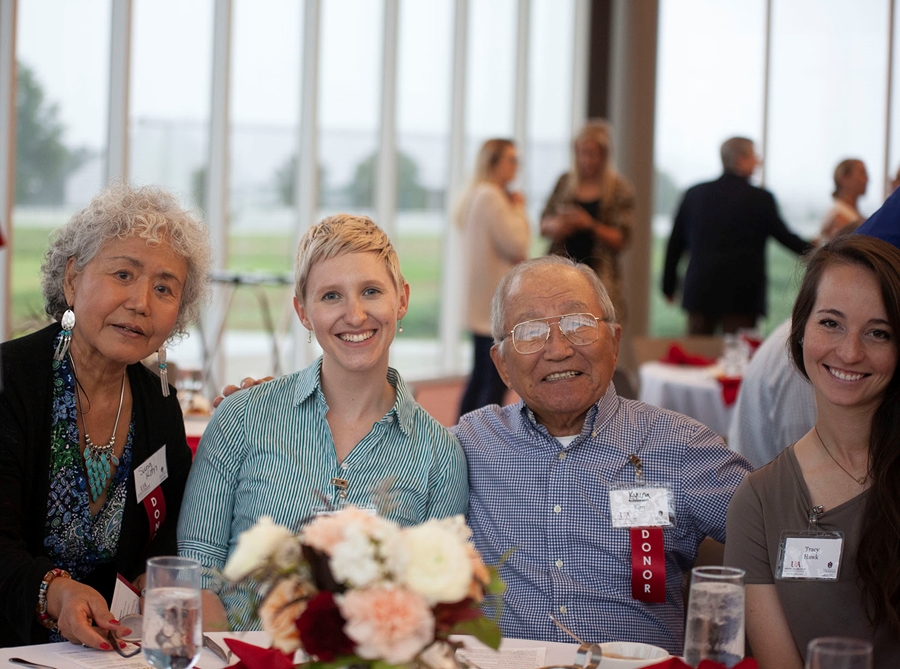
U of A alumnus and retired professor Kyung Soo Kim and his wife, Sung Boon Kim, have established a graduate student fellowship with a gift of $150,000 in the Dale Bumpers College of Agricultural, Food and Life Sciences.
The Dr. Kyung Soo & Sung Boon Kim Endowed Graduate Fellowship will be awarded to a graduate student in the Department of Entomology and Plant Pathology who is pursuing a master's degree or Ph.D. and demonstrates dedication to the enhancement of the science and field of plant virology.
Kim was born in Seoul, Korea, in 1933 and raised in North Korea until fleeing to South Korea during the Korean conflict in 1950. After earning his bachelor's degree in biology from Kyung Puk National University in Korea, he earned a master's degree in zoology (1963) and Ph.D. in plant pathology (1971) from the U of A.
He became assistant professor in what was then the Department of Plant Pathology in 1974, was appointed University Professor in 1993 and retired in 2002.
In recognition of his contributions in science to the university community and outstanding research, he received the U of A Alumni Association Award for Outstanding Research in 1989. Kim is a Fellow of the American Association for the Advancement of Science and The American Phytopathological Society, a member of the American Society for Cell Biology and Gamma Sigma Delta, and served as associate editor of Virology.
Kim was responsible for administration of the university-wide electron microscope facility, and each spring taught a course in the use of electron microscopy in biology. His research, primarily directed toward plant cell ultrastructure with particular regard to the reactions of plant cells to virus infection, was recognized in national and international circles.
In collaboration with others, Kim pioneered research on the ultrastructural response of host plants to whitefly-transmitted geminiviruses whose etiological agents had been unknown for almost a century. Studies led to discovery of a unique DNA-containing inclusion in cells infected with bean golden mosaic virus, an economically important whitefly-transmitted geminivirus. Referred to as "Kim's bodies" by some investigators, they have been instrumental in diagnosing the diseases caused by whitefly-transmitted geminiviruses occurring throughout the world.
Kim has worked closely with virologists at the U of A and collaborated with others at institutions in the U.S., and had cooperative research with scientists from Brazil, Costa Rica, Canada, Puerto Rico, Great Britain, Korea, Japan, Thailand, China and Israel. He has also collaborated with scientists in areas of entomology, agronomy, animal science, botany and zoology.
Since retiring, he has been involved in teaching and research programs in an advisory capacity at Seoul National University and the Rural Development Administration in the Republic of Korea.
About the Dale Bumpers College of Agricultural, Food and Life Sciences: Bumpers College provides life-changing opportunities to position and prepare graduates who will be leaders in the businesses associated with foods, family, the environment, agriculture, sustainability and human quality of life; and who will be first-choice candidates of employers looking for leaders, innovators, policy makers and entrepreneurs. The college is named for Dale Bumpers, former Arkansas governor and longtime U.S. senator who made the state prominent in national and international agriculture. For more information about Bumpers College, visit our website, and follow us on Twitter at @BumpersCollege and Instagram at BumpersCollege.
About the University of Arkansas: As Arkansas' flagship institution, the U of A provides an internationally competitive education in more than 200 academic programs. Founded in 1871, the U of A contributes more than $2.2 billion to Arkansas' economy through the teaching of new knowledge and skills, entrepreneurship and job development, discovery through research and creative activity while also providing training for professional disciplines. The Carnegie Foundation classifies the U of A among the top 3% of U.S. colleges and universities with the highest level of research activity. U.S. News & World Report ranks the U of A among the top public universities in the nation. See how the U of A works to build a better world at Arkansas Research News.
Topics
Contacts
Robby Edwards, director of communications
Dale Bumpers College of Agricultural, Food and Life Sciences
479-575-4625,